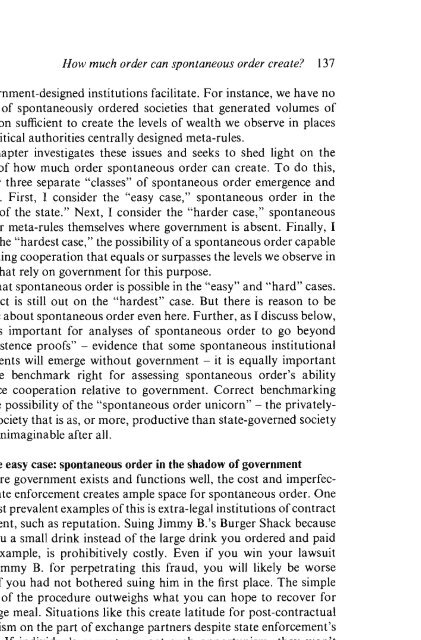Handbook on Contemporary Austrian Economics
Handbook on Contemporary Austrian Economics
Handbook on Contemporary Austrian Economics
Create successful ePaper yourself
Turn your PDF publications into a flip-book with our unique Google optimized e-Paper software.
How much order can sp<strong>on</strong>taneous order create 137<br />
that government-designed instituti<strong>on</strong>s facilitate. For instance, we have no<br />
examples of sp<strong>on</strong>taneously ordered societies that generated volumes of<br />
cooperati<strong>on</strong> sufficient to create the levels of wealth we observe in places<br />
where political authorities centrally designed meta-rules.<br />
This chapter investigates these issues and seeks to shed light <strong>on</strong> the<br />
questi<strong>on</strong> of how much order sp<strong>on</strong>taneous order can create. To do this,<br />
I c<strong>on</strong>sider three separate "classes" of sp<strong>on</strong>taneous order emergence and<br />
operati<strong>on</strong>. First, I c<strong>on</strong>sider the "easy case," sp<strong>on</strong>taneous order in the<br />
"shadow of the state." Next, I c<strong>on</strong>sider the "harder case," sp<strong>on</strong>taneous<br />
order over meta-rules themselves where government is absent. Finally, I<br />
c<strong>on</strong>sider the "hardest case," the possibility of a sp<strong>on</strong>taneous order capable<br />
of generating cooperati<strong>on</strong> that equals or surpasses the levels we observe in<br />
societies that rely <strong>on</strong> government for this purpose.<br />
I find that sp<strong>on</strong>taneous order is possible in the "easy" and "hard" cases.<br />
The verdict is still out <strong>on</strong> the "hardest" case. But there is reas<strong>on</strong> to be<br />
optimistic about sp<strong>on</strong>taneous order even here. Further, as I discuss below,<br />
while it is important for analyses of sp<strong>on</strong>taneous order to go bey<strong>on</strong>d<br />
mere "existence proofs" - evidence that some sp<strong>on</strong>taneous instituti<strong>on</strong>al<br />
arrangements will emerge without government - it is equally important<br />
to get the benchmark right for assessing sp<strong>on</strong>taneous order's ability<br />
to produce cooperati<strong>on</strong> relative to government. Correct benchmarking<br />
makes the possibility of the "sp<strong>on</strong>taneous order unicorn" - the privatelyordered<br />
society that is as, or more, productive than state-governed society<br />
- not so unimaginable after all.<br />
10.2 The easy case: sp<strong>on</strong>taneous order in the shadow of government<br />
Even where government exists and functi<strong>on</strong>s well, the cost and imperfecti<strong>on</strong><br />
of state enforcement creates ample space for sp<strong>on</strong>taneous order. One<br />
of the most prevalent examples of this is extra-legal instituti<strong>on</strong>s of c<strong>on</strong>tract<br />
enforcement, such as reputati<strong>on</strong>. Suing Jimmy B.'s Burger Shack because<br />
it gave you a small drink instead of the large drink you ordered and paid<br />
for, for example, is prohibitively costly. Even if you win your lawsuit<br />
against Jimmy B. for perpetrating this fraud, you will likely be worse<br />
off than if you had not bothered suing him in the first place. The simple<br />
time-cost of the procedure outweighs what you can hope to recover for<br />
the average meal. Situati<strong>on</strong>s like this create latitude for post-c<strong>on</strong>tractual<br />
opportunism <strong>on</strong> the part of exchange partners despite state enforcement's<br />
existence. If individuals cannot prevent such opportunism, they w<strong>on</strong>'t<br />
enter exchange agreements with others and the market shrinks al<strong>on</strong>g<br />
with individuals' ability to capture the gains from cooperating. C<strong>on</strong>tracts<br />
with a credit comp<strong>on</strong>ent to them create another kind of post-c<strong>on</strong>tractual<br />
opportunism. Here, since payment is separated from provisi<strong>on</strong>, the debtor

















